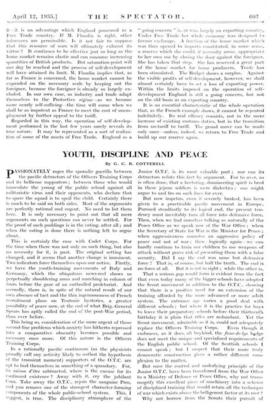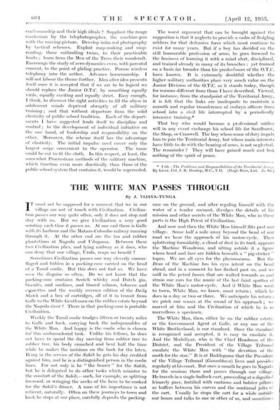YOUTH, DISCIPLINE AND PEACE
By G. C. B. COTTERELL
PASSIONATELY rages the sporadic guerilla between the pacific detractors of the Officers Training Corps and its bellicose supporters ; between those who would innoculate the young of the public school against all militaristic virus and their opponents, who declare that to spare the squad is to spoil the child. Certainly there is much to be said on both sides. Most of the arguments are perfectly rational and cogent. No need to list them here. It is only necessary to point out that all mere arguments on such questions can never be settled. For the proof of such puddings is in the eating, after all ; and when the eating is done there is nothing left to argue about.
This " is certainly the case with Cadet Corps. For the time when there was not only no such thing, but also no necessity for it, is past. The original setting has changed, and it seems that another change is imminent. Two indicators force themselves upon our notice. Firstly, we have the youth-training movements of Italy and Germany, which the ubiquitous news-reel shows us perpetually shouldering arms and marching in column of fours before the gaze of an enthralled proletariat. And secondly, there is, in spite of the natural result of our own absence of tact and the thin ingenuousness of French recruitment plans on Teutonic hysterics, a greater possibility of peace now, at the end of what Brig.-General Spears has aptly called the end of the post-War period, than ever before.
This being so, consideration of the more urgent of those second-line problems which anxiety has hitherto repressed into a comparative obscurity becomes possible and necessary once more. Of this nature is the Officers Training Corps.
In a rationally pacific continuum (as the physicists proudly call any activity likely to outlast the hypothesis of the transient moment) supporters of the O.T.C. are apt to find themselves in something of a quandary. For, its raison d'être subtracted, where is the excuse for its continued existence ? Away with it, cry the jubilant Cons. Take away the O.T.C., rejoin the sanguine Pros, and you remove one of the strongest character-forming components of the whole public-school system. This, I suggest, is true. The disciplinary atmosphere of the Junior O.T.C. is its most valuable part ; nor can -its detractors refute this fact by argument. For to aver, as is often done, that a hectoring, domineering spirit is bred in these jejune soldiers is mere dialectics : one might argue to and fro on such lines for ever.
But now impetus, even if severely braked, has been given to a practicable pacific movement in Europe. Pursued steadfastly to its logical end, the present ten- dency must inevitably turn all force into defensive force. Then, when we find ourselves talking as naturally of the Peace Office as we speak now of the War Office ; when the Secretary of State for War is the Minister for Peace ; when aggressiveness connotes an aggressive policy of peace and not of war ; then—logically again—we can hardly continue to train our children to use weapons of attack without grave risk of presenting them with a false security. Did I say the end was none but defensive force ? That is, of course, but half the truth. The end is no force at all. But it is not in sight ; while the other is.
That a serious gap would form is evident from the fact that even today many of the bigger schools have adopted the Scout movement in addition to the O.T.C., showing that there is a positive 'need for an extension of the training afforded by the more advanced or more adult system. The entrance age varies a good deal with • different schools ; but where it is the practice for boys to leave their preparatory schools before -their thirteenth birthday it is plain that rifles are redundant. Yet the Scout movement, admirable as it is, could not adequately replace the Officers Training Corps. Even though it embraces, as it does, all 1)03-kind, the fleur-de-lys badge does not meet the unique and specialized requirements of the English public school. Of the Scottish schools I cannot speak ; but I suspect that their more truly democratic construction gives a rather different com- plexion to the matter.
But once the control and underlying principle of the Junior O.T.C. have been transferred from the War Office to a Ministry of Defence or Peace Office, why not trans- mogrify this excellent piece of machinery into a scheme of disciplined training that would retain all the technique of war which exists above the belligerent factor at its root ?
Why not borrow from the Scouts their pursuit of craftsmanship and their high ideals ? Supplant the range marksman by the telephotographer, the machine-gun with the moving-picture. Develop infra-red photography by tactical schemes. Exploit map-making and map- reading, those enthralling twins, to their practicable limits ; learn from the Men of the Trees their woodcraft. Encourage the study of aero-dynamics even, with parental consent, to the point of gliding. practice. Pursue wireless telephony into the aether. Advance horsemanship. I will not labour the theme further. Idea after idea presents itself once it is accepted that if we are to be logical we should replace the Junior O.T.C. by something equally virile, equally exciting and equally strict. Easy enough, I think, to discover the right activities to fill the abyss in adolescent minds deprived abruptly of all military training ; and that without departure from the solid elasticity of public school tradition. Each of the depart- ments I have suggested lends itself to discipline and control ; to the development of individual initiative on the one hand, of leadership and responsibility on the other. Moreover, the scheme itself has the advantage of elasticity. The initial impulse need cover only the largest scope convenient to the operator. The tunic could be cut to fit the cloth. In this respect, at least, the somewhat Procrustean methods of the military machine, which function even more drastically than those of the public school system that contains it, would be superseded. The worst argument that can be brought against the suggestion is that it neglects to provide a cadre of fledgling soldiers for that defensive force which must continue to exist for many years. But if a boy has decided on the still honourable profession of arms, he goes forward to the business of learning it with a mind alert, disciplined, and trained already in many of its branches : yet trained on a basis far broader than his predecessors of the O.T.C. have known. It is extremely doubtful whether the higher military authorities place very much value on the Junior Division of the O.T.C. as it stands today, though for reasons different from those I have described. Viewed, for instance, from the standpoint of the Territorial Army, it is felt that the links are inadequate to maintain a smooth and regular transference of embryo officers from school into a civil life interrupted by a periodically intensive training.* That boy who would become a professional soldier will in any event exchange his school life for Sandhurst, the Shop, or Cranwell. The boy whose sense of duty impels him to join the Territorial Army, but whose main interests have little to do viith the bearing of arms, is not neglected. The remainder ? They will have gained much and lost nothing of the spirit of peace.
* Vide : The Problems and Responsibilities of the Territorial Armg. By Lieut.-Col. J. K. Dunlop, M.C., T.D. (Hugh Rees, Ltd. 2a. W.)



















































 Previous page
Previous page